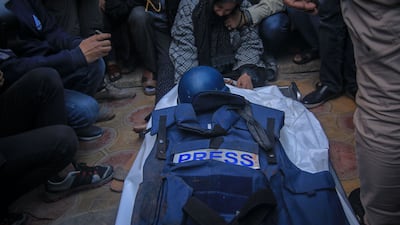Live updates: Follow the latest on Israel-Gaza
Barely a week after Hamas’s horrific attack on October 7 and Israel’s subsequent brutal war on the Gaza strip, in the course of my reporting I received some criticism from an Israeli friend and fellow journalist who told me to “be careful about undoing much of the progress of the Abraham Accords”, while a Palestinian friend was appalled that I was interviewing officials from Tel Aviv.
That day, the front page of The National’s newspaper carried the photograph of Alma Hashish, a little girl in Gaza who spoke to our correspondent in the enclave about the horrors of living through the war.
Alma was just one of more than 6,000 Gazans at the time of publication who had been injured in the recent Israeli bombing campaigns.
“Little Alma, her shattered family, and the young nephew she lost when the bombs rained down” was the headline above her photo.
The Israeli journalist asked why we weren’t focusing on the suffering of Israeli children in equal measure.
One Israeli official asked about the alleged reports of 40 beheaded babies. But that claim, first made in a report by the Israeli outlet i24News, has since been widely discredited.
Nonetheless, the report was at the time widely picked up, and echoed by Israeli Prime Minister Benjamin Netanyahu’s spokesman. It helped shape the already-fraught narrative and widened the polarisation that ensued in what is one of the most brutal, ugly and devastating wars of our generation.
I had asked the Israeli official for proof of those beheaded babies since they had admitted to seeing as such. I never received a direct answer, or even another phone call.
I was one of the first English-speaking journalists to get an official reaction and comment from Hamas, when Osama Hamdan, the Palestinian militant group’s political representative in Lebanon, confirmed to me that efforts toward mediation talks had begun two days after October 7. A contact at Hamas’s rival Palestinian group Fatah reprimanded me for giving the former “so much” attention during those early days.
In that same October 9 article I had authored, I also spoke to Lior Haiat, an Israeli government spokesperson. In the weeks, and unfortunately months to come, I and many of my colleagues in the Arab media world would be accused of bias for speaking to all sides involved in the war. My former colleagues at AlArabiya Taher Barake and and Layal Al Ekhtiar – both Lebanese – are contending with possibly never going back to their home country. The reason is they both interviewed Avichay Adraee, who serves as the head of the Arab media division of the Israeli military. Both have pending warrants from the authorities in Lebanon due to a 1955 law on boycotting Israel that prohibits any and all interaction between Lebanese and Israelis.
I was in Lebanon this week and invited to attend a multi-sectarian forum at the Anwar Fatayri Foundation in Chouf, where this exact topic was debated. Former Lebanese Minister of Information Ghazi Aridi said cases like Taher’s and Layal’s are unfortunate as the spirit of the law in question has been interpreted to include journalists doing their jobs.
“The debate here is the law specifies all communication with the enemy. But the debate will always take place whether Lebanese journalists inviting Israeli guests on their broadcasts and asking tough questions constitute a betrayal of the law. It’s very unfortunate,” he told the audience at the forum.
Objectivity in journalism is a foundational principle, and there’s no need for me to debate that as a guiding rule that compels us to present all facts – and all sides – to the best of our ability.
Few stories have ever divided our world as much as the ongoing one on Gaza. There’s no doubt about it. In a conflict where both sides fail to see the other’s humanity, my colleagues and I have gone to painstaking efforts to report on the horrors this war has inflicted.
Audience perception plays a crucial role. Readers and viewers bring their own biases and preconceptions to the table. This war has only amplified that point. They often seek out news that aligns solely with their viewpoints, leading to echo chambers where only certain aspects of the conflict are highlighted. Our job as journalists in these troubling times to navigate these challenges has never been more profound, knowing that our efforts to present a whole-picture view might be dismissed or criticised by those firmly entrenched in their own perspectives.
If anything, the past nine months have shown that the cost of innocent lives at the expense of political interests is high.
When the world is adamant for us to choose sides, we’re trying our best to choose humanity. The only way forward is to do that as best we can. Failure to do so is as much a cardinal sin.


